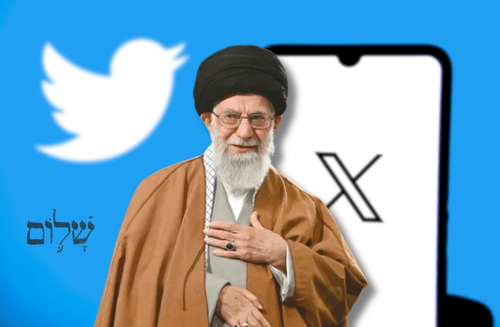The office of Iranian Supreme Leader Ali Khamenei had launched a new Hebrew-language account on Saturday. But a mere day later, on Sunday, it had become inaccessible.
Elon Musk’s X platform suspended the account for violating the rules of the site. Early Monday, a short message appeared on the suspended account stating, "X suspends accounts which violate the X Rules."
It wasn't immediately clear which rule or rules had been violated, but the account's first message was a standard Islamic greeting which said, "In the name of God, the most merciful."
The second post is translated as follows: "Zionists are making a miscalculation with respect to Iran. They don't know Iran. They still haven't been able to correctly understand the power, initiative, and determination of the Iranian people."
This statement had also been issued on the English account, and was connected with a speech the Ayatollah gave. The messaging comes in the wake of the overnight Friday Israeli airstrikes on military facilities in Iran, in response to the Oct.1st ballistic missile attack on Israel.
But the message didn't seem particularly threatening to Israel or any particular group - though it's possible that X took issue with the Ayatollah directing a message in Hebrew to "Zionists"... perhaps.
The Islamic Republic says "limited damage" took place at sites in three provinces and has touted the right to hit back; however, the tit-for-tat is likely to cease at this point.
Khamenei along with some other Iranian government leaders maintains several foreign language accounts on X. According to Fortune:
This isn’t the first time Khamenei has seen a suspension or removal from social media. In February, Meta removed Facebook and Instagram accounts for the supreme leader over his support of the militant group Hamas after its Oct. 7, 2023, attack on Israel.
But ironically US-based social media platforms including X and Facebook have remained officially blocked within Iran for years - bans which have come especially in the wake of occasional large-scale anti-government protests, including the recent unrest related to the compulsory hijab law for women.
The office of Iranian Supreme Leader Ali Khamenei had launched a new Hebrew-language account on Saturday. But a mere day later, on Sunday, it had become inaccessible.
Elon Musk’s X platform suspended the account for violating the rules of the site. Early Monday, a short message appeared on the suspended account stating, "X suspends accounts which violate the X Rules."
It wasn't immediately clear which rule or rules had been violated, but the account's first message was a standard Islamic greeting which said, "In the name of God, the most merciful."
The second post is translated as follows: "Zionists are making a miscalculation with respect to Iran. They don't know Iran. They still haven't been able to correctly understand the power, initiative, and determination of the Iranian people."
This statement had also been issued on the English account, and was connected with a speech the Ayatollah gave. The messaging comes in the wake of the overnight Friday Israeli airstrikes on military facilities in Iran, in response to the Oct.1st ballistic missile attack on Israel.
But the message didn't seem particularly threatening to Israel or any particular group - though it's possible that X took issue with the Ayatollah directing a message in Hebrew to "Zionists"... perhaps.
The Islamic Republic says "limited damage" took place at sites in three provinces and has touted the right to hit back; however, the tit-for-tat is likely to cease at this point.
Khamenei along with some other Iranian government leaders maintains several foreign language accounts on X. According to Fortune:
This isn’t the first time Khamenei has seen a suspension or removal from social media. In February, Meta removed Facebook and Instagram accounts for the supreme leader over his support of the militant group Hamas after its Oct. 7, 2023, attack on Israel.
But ironically US-based social media platforms including X and Facebook have remained officially blocked within Iran for years - bans which have come especially in the wake of occasional large-scale anti-government protests, including the recent unrest related to the compulsory hijab law for women.


